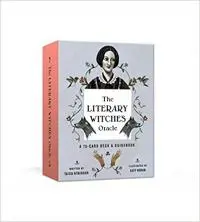Image via Alex Kozlov
We’ve all sat in front of the blank page, cursor blinking, anxiety spiking, coffee cup needing a refill. To writers, honestly there is nothing more terrifying than staring into that emptiness, into all that untapped possibility. I can’t even begin to tell you about the number of nights I’ve sat at my computer, deleting words, rewriting outlines, wearing out the backspace key, and yelling at the wall. It’s maddening.
A few years ago, I wrote a blog post about creative burnout. It was vulnerable, raw, and I was terrified to publish it because I was worried about what people would think. Would my work somehow become less valid? Would people forget about me if I took a break? Would publishers not want to work with me anymore? Does any of that really matter if I’m suffering? The response was overwhelmingly positive, and a lot of people reached out to me about their own experiences with writer’s block, burnout, and this pressure to constantly be creating content. These conversations forced me to look at my own routine and reevaluate what was no longer working for me: the 14-hour workdays, the Goodreads reading challenge, writing a new poetry collection ever year, saying yes to projects because I was afraid to disappoint people, etc. I needed some space to recharge and recommit myself to writing in a way that let me breathe and become excited about creating again.
 Now, I spent a lot of time not writing, but I was always conjuring stories in my head. I read a lot of books, watched a lot of movies, traveled, went to museums. I listened to podcasts, did sun salutations when I woke up. I started studying herbalism. I even started taking some classes in psychology and philosophy to work my brain in a different way. After about two years, I started to feel this gentle return, like I was coming home after a long, arduous journey. I felt energized, refreshed, but when I sat down to finally work, the only thing waiting for me was that blank page. Imposter syndrome immediately set in. Did I forget how to write? Can I still do this? Does anyone even care if I start writing again? I started to doubt myself. What if I don’t enjoy it as much as I used to? What if it’s too hard? What if I just went to sleep and tried again tomorrow? The voices were vile, self-depreciating, and they hurt, and my usual tricks for beating writer’s block weren’t working, so I knew I had to try something new.
Now, I spent a lot of time not writing, but I was always conjuring stories in my head. I read a lot of books, watched a lot of movies, traveled, went to museums. I listened to podcasts, did sun salutations when I woke up. I started studying herbalism. I even started taking some classes in psychology and philosophy to work my brain in a different way. After about two years, I started to feel this gentle return, like I was coming home after a long, arduous journey. I felt energized, refreshed, but when I sat down to finally work, the only thing waiting for me was that blank page. Imposter syndrome immediately set in. Did I forget how to write? Can I still do this? Does anyone even care if I start writing again? I started to doubt myself. What if I don’t enjoy it as much as I used to? What if it’s too hard? What if I just went to sleep and tried again tomorrow? The voices were vile, self-depreciating, and they hurt, and my usual tricks for beating writer’s block weren’t working, so I knew I had to try something new.
In order to focus, meditation became a routine practice before I sat down to write. I would put on some instrumental music according to my mood (or what I wanted to write), and then I would just drift off in between breaths. This takes some practice, but if stillness is hard for you, some other methods of introspection that might help are divinatory practices like scrying or reading tea leaves. Personally, scrying has become a favorite method of mine when it comes to brainstorming, lately. I bought a small ornate black mirror I like to place on my desk next to a lit candle. A quick note about color magic: orange is great for supporting creativity, blue will help with communication and with opening up your throat chakra, and black is great for protection if you feel like you’ll be writing through or about trauma, heartbreak, etc. As a poet, I tend to use black candles the most. After gathering my thoughts, I fall into the mirror, searching through patterns, reflections, the flicker of the flame. Sometimes I find ideas and characters staring back at me, and sometimes, I feel nothing but a gentle peace.
The same goes for reading tea leaves, which is an ancient practice known as tasseography. What I love most about this ritual is it not only feels intuitive, but I feel like I’m literally consuming my story and the answers to my questions. When it comes to teas I like to work with, peppermint is great for clarity, lavender for stress, rosemary for memory, and ginger works well for creativity. With that said, feel free to use whatever you have on hand or feel drawn to. This practice of drinking the tea and searching through images, symbols, placement, etc. is a fun way to journal through the particular question you have about your project, and it helps to further set your intent. A great article that goes into the steps of the process more can be found here.
Another ritual I like to do when I feel stuck is automatic writing. I’ll take out my journal, set a timer for 3-5 minutes and just start writing, and I won’t stop or lift up my pen until the timer goes off. Sometimes I’m scribbling, I don’t know what I’m writing about repetitively for a minute or two straight, but eventually words, phrases, and thoughts start coming out. I even had a professor in college who used to make us do a version of this on our laptops in class. He told us to tilt our screens down so we couldn’t see anything and just write. Both tactics, regardless of how you do them, are great because they allow you to turn off your internal editor. This way, you’re not worried about making sense, fixing typos, or questioning whether you’re being grammatically correct or not. You’re just putting in the time and writing down the words and, in the end, that’s all any of us can really hope for with a first draft.
 My final two rituals I sometimes explore often go hand in hand. These days, I’ve turned my writing desk into a kind of altar, and on it, I have lots of statues, crystals, teas, and books that are important to me, but something else I always keep close by is my oracle deck. I like to work with the Literary Witches deck, and before I write (and I especially like to do this with my poetry), I’ll pull a card and write to the symbol or presence that comes up. This helps me unlock memories, make new associations with symbols, and get my brain focused and ready to create. Sometimes though, the voice of imposter syndrome gets too loud even here, and I need an extra push to set me on my path. When this happens, I’ll take my brainstorming pages and set them aside. I’ll then cut up a few strips of paper and write words like fear, writer’s block, failure, etc. on them and then take all of that over to my cauldron or walk it out to my fire pit and burn them in an effort to release all of that worry, anxiety, and trepidation into the air.
My final two rituals I sometimes explore often go hand in hand. These days, I’ve turned my writing desk into a kind of altar, and on it, I have lots of statues, crystals, teas, and books that are important to me, but something else I always keep close by is my oracle deck. I like to work with the Literary Witches deck, and before I write (and I especially like to do this with my poetry), I’ll pull a card and write to the symbol or presence that comes up. This helps me unlock memories, make new associations with symbols, and get my brain focused and ready to create. Sometimes though, the voice of imposter syndrome gets too loud even here, and I need an extra push to set me on my path. When this happens, I’ll take my brainstorming pages and set them aside. I’ll then cut up a few strips of paper and write words like fear, writer’s block, failure, etc. on them and then take all of that over to my cauldron or walk it out to my fire pit and burn them in an effort to release all of that worry, anxiety, and trepidation into the air.
By doing this—or rather any of the above, really—I like to think I’m acknowledging that those apprehensions will no longer hold me back from my art, and usually when I sit back down at the computer to write, I feel a lot lighter.
I hope these tricks and rituals will help you feel the same.
Get the Literary Witches Oracle at Bookshop or Amazon
Get We Have Always Lived in this Castle at Bookshop or Amazon

About the author
Stephanie M. Wytovich is an American poet, novelist, and essayist. Her work has been showcased in numerous venues such as Weird Tales, Gutted: Beautiful Horror Stories, Fantastic Tales of Terror, Year's Best Hardcore Horror: Volume 2, The Best Horror of the Year: Volume 8, and more.
Wytovich is the Poetry Editor for Raw Dog Screaming Press, an adjunct at Western Connecticut State University, Southern New Hampshire University, and Point Park University, and a mentor with Crystal Lake Publishing. She is a member of the Science Fiction Poetry Association, and an active member of the Horror Writers Association.
Her Bram Stoker Award-winning poetry collection, Brothel, earned a home with Raw Dog Screaming Press alongside Hysteria: A Collection of Madness, Mourning Jewelry, An Exorcism of Angels, Sheet Music to My Acoustic Nightmare, and most recently, The Apocalyptic Mannequin. Her debut novel, The Eighth, is published with Dark Regions Press.
Follow Wytovich via her Substack and on Twitter @SWytovich.








